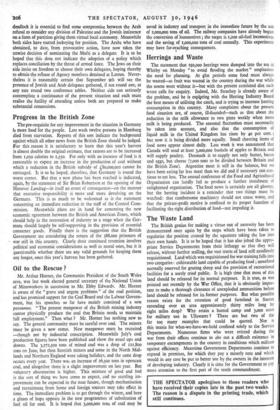The Waste Land
The British genius for making a virtue out of necessity has been demonstrated once again by the steps which have been taken to regularise the position created by the squatters taking the law into their own hands. It is to be hoped that it has also jolted the appro- priate Service Departments from their lethargy so that they will release, without further stalling, the vast tracts of land still needlessly requisitioned. Land which was requisitioned for war training falls into two categories : cultivatable land capable of producing food ; moorland normally reserved for grazing sheep and the provision of recreational facilities for a sorely tried public. It is high time that most of this land should be released for its normal purposes. It is true, as was pointed out recently by the War Office, that it is obviously impor- tant to make a thorough clearance of unexploded ammunition before land should be released for its former purposes. But what possible reason exists for the retention of good farmland in Sussex extending over an area approximately thirty miles long by eight miles deep? Why retain a hutted camp and 3,000 acres for military use in Ullswater ? These are but two of the far too many examples that could be quoted. Nor is this mania for what-we-have-we-hold confined solely to the Service Departments. Numerous firms who were evicted during the war from their offices continue to eke out a difficult existence in temporary encampments in the country in conditions which militate against efficiency. Meantime Government Departments continue to expand in premises, for which they pay a miserly rent and which would in any case be put to better use by the owners in the interests of developing industry. Clearly it is time for the Government to pay more attention to the first part of the tenth commandment.


























 Previous page
Previous page